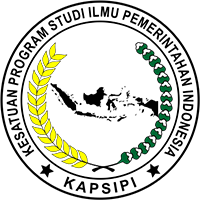Optimizing the Capacity of the Governing and Non-Governing Elites of Nagari Tuo Pariangan in the Implementation of Pacu Jawi
DOI:
https://doi.org/10.35967/njip.v23i1.672Keywords:
Capacity, Elite, Pacu Jawi, Nagari Tuo ParianganAbstract
The success of the nagari government program is determined by the capacity of the leadership elements. This research aims to analyze the capacity of the governing and non-governing elite of Nagari Tuo Pariangan in implementing pacu jawi. This research uses UNDP institutional capacity theory and JICA individual capacity. The method used is a qualitative instrumental case study approach. The results of this research are that the capacity of the governing elite of Nagari Tuo Pariangan has not been maximized in using human resources, capital and policy direction. The governing elite does not accommodate resources for the creation of trading facilities in the jawi racetrack. The capacity of the non-governing elite of Nagari Tuo Pariangan has also not played an effective role in organizing the pacu jawi. This is because bundo kanduang and religious scholars do not play an optimal role in carrying out the pacu jawi event. Several recommendations to increase the capacity of the governing elite of Nagari Tuo Pariangan, namely using a mixed top down & bottom up policy, giving tasks to bureaucrats to search for the location of the pacu jawi rice fields, allocating village funds for pacu jawi activities, creating materials and designing attractive funding proposals, preparing materials creation of traders’ stalls, using the concept of community based tourism (CBT) involving traditional elements, pacu jawi fans, people who own rice fields, people who are involved in agricultural businesses. Next, on the evaluation agenda, the Nagari Tuo Pariangan Government must interact with all actors in the pacu jawi event and accommodate suggestions submitted by each actor. Several recommendations to increase the capacity of the non-governing elite of Nagari Tuo Pariangan, such as providing renewal, adding traditional and cultural nuances, holding Nagari Tuo Pariangan cultural arts at the jawi runway, proposing a typical nagari culinary bazaar and holding an exhibition of Nagari Tuo Pariangan tambo literary works.
Downloads
References
Adlin, Amin, R. M., & Isril. (2011). Kapasitas Lembaga Badan Permusyawaratan Desa Buluh Cina Kecamatan Siak Hulu Kabupaten Kampar dalam Membuat Peraturan Desa Tahun 2010. Nakhoda: Jurnal Ilmu Pemerintahan, 10(15), 1–13. https://doi.org/10.35967/jipn.v10i1.1596
Amin, R. M., Isril, & Febrina, R. (2016). Strategi Pemberdayaan Masyarakat Melalui Pengembangan Kapasitas Kelembagaan Kampung Adat di Kabupaten Siak Provinsi Riau. Jurnal Ilmu Pemerintahan Nakhoda, 15(26), 65–77. https://doi.org/10.35967/jipn.v15i26.3844
Assyahri, W., & Vaguita, M. (2019). Evaluasi Penggunaan Aplikasi Sistem Keuangan Desa (Siskeudes) di Nagari Kayu Tanam Kecamatan 2x11 Kayutanam. Nakhoda: Jurnal Ilmu Pemerintahan, 18(2), 79–91. https://doi.org/10.35967/jipn.v18i2.7844
Brinkerhoff, D. W. (1999). State-Civil Society Networks for Policy Implementation in Developing Countries. Review of Policy Research, 16(1), 123–147. https://doi.org/10.1111/j.1541-1338.1999.tb00844.x
Center, A. H., & Jackson, P. (1995). Public Relations Practices: Managerial Case Studies and Problems. Prentice Hall.
Damayanti, E., Soeaidy, M. S., & Ribawanto, H. (2014). Strategi Capacity Building Pemerintah Desa dalam Pengembangan Potensi Kampoeng Ekowisata Berbasis Masyarakat Lokal (Studi di Kampoeng Ekowisata, Desa Bendosari, Kecamatan Pujon, Kabupaten Malang). JAP (Jurnal Administrasi Publik), 2(3), 464–470. https://administrasipublik.studentjournal.ub.ac.id/index.php/jap/article/view/408
Easton, D. (1965). A Systems Analysis of Political Life. Wiley.
Eriandi. (2023, June 9). Bundo Kandung DKI Jakarta Gelar Seni Budaya Nusantara. Harian Singgalang. https://www.hariansinggalang.co.id/berita/145649/bundo-kandung-dki-jakarta-gelar-seni-budaya-nusantara
Eriyanto. (2007). Analisis Wacana: Pengantar Analisis Teks Media. LKiS.
Hilman, Y. A., & Chollil, F. (2019). Implementasi Dana Desa untuk Kegiatan Kebudayaan Gumelaring Kadipaten di Desa Purwodadi Kecamatan Barat Kabupaten Magetan. Barista: Jurnal Kajian Bahasa dan Pariwisata, 6(2), 93–100. https://journal.poltekpar-nhi.ac.id/index.php/barista/article/view/184
Kapucu, N., Healy, B. F., & Arslan, T. (2011). Survival of the Fittest: Capacity Building for Small Nonprofit Organizations. Evaluation and Program Planning, 34(3), 236–245. https://doi.org/10.1016/j.evalprogplan.2011.03.005
Kotler, P., & Keller, K. L. (2009). Marketing Management. Prentice Hall.
Kurniawan, R. C., Maulida, K., & Hertanto, H. (2021). Networking Institutionalism by the Lampung Parliamentary Women’s Caucus in Optimizing Gender Policy. Nakhoda: Jurnal Ilmu Pemerintahan, 20(2), 152–163. https://doi.org/10.35967/njip.v20i2.158
McCourt, W. (2007). The Merit System and Integrity in the Public Service (20; Institute for Development Policy and Management Development Economics and Public Policy Working Papers).
Meilia, F. D., & Pinasti, V. I. S. (2022). Upaya Mempertahankan Keberadaan Kesenian Almadad di Desa Kadudodol Kecamatan Cimanuk Pandeglang-Banten. E-Societas, 11(1), 1–15. https://doi.org/10.21831/e-societas.v11i1.15766
Monika, R. (2023). Eksistensi Debus di Desa Alus-Alus Kecamatan Teupah Selatan Kabupaten Simeulue [Undergraduate Thesis, Universitas Islam Negeri Ar-Raniry]. https://repository.ar-raniry.ac.id/id/eprint/35404
Ripley, R. B., & Franklin, G. A. (1982). Bureaucracy and Policy Implementation. Dorsey Press.
Stake, R. E. (2011). Program Evaluation Particularly Responsive Evaluation. Journal of MultiDisciplinary Evaluation, 7(15), 180–201. https://doi.org/10.56645/jmde.v7i15.303
Sudirman, F. A., & Saidin. (2022). Pemerintahan Berbasis Elektronik (E-Government) dan Pembangunan Berkelanjutan: Reviu Literatur Sistematis. Nakhoda: Jurnal Ilmu Pemerintahan, 21(1), 44–58. https://doi.org/10.35967/njip.v21i1.269
Tinov, M. Y. T., & Handoko, T. (2016). Penguatan Kelembagaan Desa dalam Mewujudkan Otonomi di Desa-desa Pesisir: Studi di Desa Sokop Kecamatan Rangsang Pesisir Kabupaten Kepulauan Meranti. Nakhoda: Jurnal Ilmu Pemerintahan, 15(26), 98–111. https://doi.org/10.35967/jipn.v15i26.3849
Van Velsor, E., McCauley, C. D., & Ruderman, M. N. (2010). The Center for Creative Leadership Handbook of Leadership Development. Wiley.
Wearing, S., & McDonald, M. (2002). The Development of Community-based Tourism: Re-thinking the Relationship Between Tour Operators and Development Agents as Intermediaries in Rural and Isolated Area Communities. Journal of Sustainable Tourism, 10(3), 191–206. https://doi.org/10.1080/09669580208667162
Downloads
Published
How to Cite
Issue
Section
License
Copyright (c) 2023 Authos(s)

This work is licensed under a Creative Commons Attribution-NonCommercial-ShareAlike 4.0 International License.





